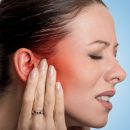Frozen Shoulder Syndrome (RSDS)

Adhesive encapsulitis (Frozen Shoulder)
The frozen shoulder is a multifactorial disease characterized by inflammatory adhesion and stiffness of the glenohumeral capsule, pain in the shoulder, and limitation of movements in all directions (especially abduction, external rotation, and posterior extension). The age of onset falls between 30 and 70 years, with an average of fifty. More females are affected than males, with the left shoulder more often involved than the right .
The prevalence of frozen shoulder is about 2%–5%. Risk factors include diabetes, thyroid diseases, stroke, and autoimmune diseases. The prevalence of frozen shoulder in patients with diabetes is as high as 10%–20% and in patients with paralysis 16%–84%.
Effectiveness of Osteopathic Treatment for Frozen Shoulder
Osteopathic manual mobilization therapy along with general exercises and exercises alone brought improvements in outcome measure scales for pain, glenohumeral ranges and shoulder pain and disability index but none of intervention is significantly effective over one another in 5 weeks of treatment (Ali and Khan, 2015).














